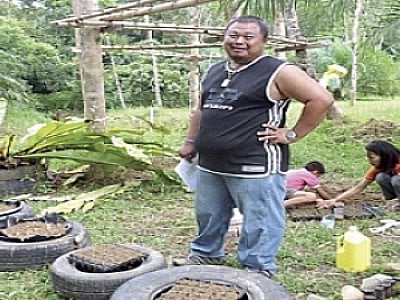Phuket Lifestyle: Kids are doing it for themselves

PHUKET: As part of its philosophy to teach young Thai students the importance of self-sufficiency and respect for the environment, the Yaowawit Boarding School and Lodge has developed a model agricultural project which demonstrates the fundamentals of independence for small farmers.
Located in the middle of a Phang Nga jungle, far away from the glamor of international tourism or even modern Thai life, the Yaowawit School was founded by a German philanthropist and an American architect with the support of Princess Maha Chakri Siridhorn and the Thai government.
The school is home to 120 students, age four to 18 years, who are accepted from around Phang Nga based on their financial and personal needs. Some are survivors of the 2004 tsunami and all come from fractured homes where one or both of their parents are dead or missing.
Sabine Kraus is the Project Manager for Yaowawit.
“Our goal is for these children to develop their personal inner resources and to become productive members of their society. Our teaching stresses the importance of being responsible for one’s own actions as well as one’s effect on the local environment. We have developed the 10-station Learning Center so the students can see how to make organic foods in a way that does not harm the environment,” she said.
With the help of committed volunteers, Christian von Aufess and Addy Ukhatarn, the Yaowawit School has taken a large portion of their 120-rai piece of land to develop agricultural products.
“We are constantly under pressure to raise funds to continue our operations. We are hoping that by growing most of our own foods, we can become self-sufficient. We are currently able to get some revenue from rice cultivation and palm oil production, but it is not enough,” said Sabine.
To create needed revenue, the school has added six rooms which are rented to visiting groups or others who want to help the school and explore the surrounding beauty. They are also developing products based on what they produce at the farm, such as massage oils and organic drinks made from Thai fruits and herbs.
Students learn how to make organic fertilizers from vegetable scraps and rotting organic materials. A station with water pumps, powered by students who pedal bicycles, is connected to a canal bringing water directly onto fields of vegetables. Recycling is core to the program. Learning to be innovative with objects that most people would throw away, the students decorate old shoes and helmets as planters for young vegetables or flowers.
The 10 different stations in the project are designed to create a self-sustaining farm. The fish pond was seeded with 2,000 small catfish that are being raised for sale in the local community market as well as for use in students’ meals in the school restaurant.
“For our school to become more self-reliant we need the participation of local and international sponsors. We are fortunate to receive support from the Swiss Education Group, the German Embassy and a few corporate and individual sponsors, but we still need the help of the community and people who can donate their time or some funds to keep our school in operation.
“We invite people to sponsor a child for only 2,000 baht a month or to volunteer their skills in art, dance, sports and so on, to share with our students,” Sabine says.
To learn more about the Yaowawit School Kapong, visit Yaowawit.com or call Sabine Kraus at 082-283 8355.
— Bruce Stanley
Latest Thailand News
Follow The Thaiger on Google News:


























